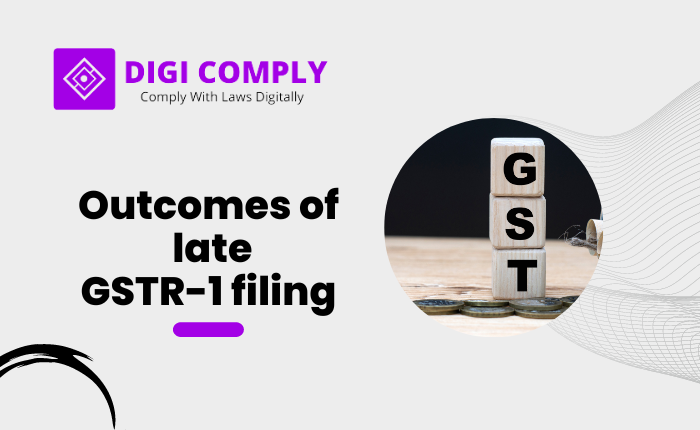In the intricate landscape of Goods and Services Tax (GST), the precision and timeliness with which taxpayers file their returns stand as pillars of paramount significance. Within the realm of GST compliance, the punctual submission of GST Returns bears equal weight, as the repercussions for failing to adhere to deadlines extend not only to the registered taxpayer but also cast a shadow on the recipients of supplied goods and services. Among the pivotal instruments within the framework of GST compliance, two forms, namely GSTR-1 and GSTR-3B, play a pivotal role in encapsulating the complex tax ecosystem.
- Form GSTR-1 assumes the role of a meticulous repository, capturing an exhaustive array of details pertaining to outward supplies of goods and services.
- Its counterpart, Form GSTR-3B, serves as a comprehensive summary return that serves as a nexus for crucial information encompassing tax liability, input tax credit, and the quantum of payable tax.
-
Filling out Form GSTR-1 is like a regular task that happens every month or quarter for GST requirements. Sometimes, you can also choose to submit invoices monthly using Invoice Furnishing Facility (IFF), but that’s optional. This return is like a pathway for a registered entity to wrap up a complete summary of the different supplies they provided.
Embedded within Form GSTR-1 is a multitude of intricate facets, ranging from taxable outward supplies tailored for registered entities to the inter-state taxable outward supplies tailored for unregistered entities, zero-rated supplies that transcend international boundaries, and the realm of deemed exports, just to scratch the surface. But not submitting GSTR-1 on time leads to serious consequences, each with its own effects.
Ineligibility to claim Input Tax Credit (ITC)
Foremost among these is the pronounced ineligibility to assert Input Tax Credit (ITC). Should a supplier inadvertently falter in filing GSTR-1 within the stipulated timeframe, a cascade of repercussions unfolds, impacting the recipient of the goods or services who is then stripped of the privilege to claim ITC during the corresponding window in their GSTR-3B return.
- In simpler terms, this means that the person receiving something will have a hard time using the taxes they paid while buying it to reduce the taxes they owe later. This leads to having to pay more taxes overall.
- Consequently, the failure to file GSTR-1 punctually severely restricts the recipient’s capacity to assert ITC hinged upon the invoices issued by the supplier.
- This, in turn, casts a profound ripple effect on their cash flow dynamics, necessitating the full settlement of taxes pertaining to the acquired goods or services.
Differences between GSTR-2A and GSTR-2B
When you forget to submit GSTR-1, it creates problems in other forms like GSTR-2A and GSTR-2B. These forms show transactions between you and your suppliers. If you don’t submit GSTR-1, these transactions won’t show up in those forms. This causes difficulties in matching your records with the supplier’s records. This can lead to big problems in fixing these differences, which could turn into disputes if not solved.
Failure to adhere to GST regulations
Simplifying the situation further, failing to adhere to the deadline for submitting your GSTR-1 under the GST regulations can result in various negative consequences. This non-compliance can trigger penalties and legal entanglements. Additionally, there’s a significant risk that your GST registration could be revoked, effectively prohibiting you from engaging in any transactions or operations that involve GST within the Indian context.
In essence, missing the GSTR-1 filing deadline not only invites financial repercussions and legal issues, but it also threatens the very existence of your business within the framework of the GST system. The potential cancellation of your GST registration looms as a daunting possibility, which, if realized, would strip your business of its ability to participate in activities that are governed by GST regulations in India. This underscores the critical importance of timely and accurate submission of GST-related documentation to avoid such dire ramifications.
Late Fees
The late submission of returns within the GST ambit incurs not just the wrath of penalties but also accumulates late fees. Each passing day beyond the due date bears a cost, with the current late fee pegged at Rs. 50 per day per Act, eventually capping at Rs. 5,000 per Act. Notably, the late fees for GSTR-1 adhere to a cumulative trajectory, thereby magnifying the financial ramifications in direct proportion to the duration of delay in return submission.
Penalties
Penalties are like reminders of what happens if you don’t submit GSTR-1. They show how important it is to follow the rules. The more you don’t follow, the bigger the penalties get.
In simple terms, submitting GSTR-1 and GSTR-3B forms on time is really important for following the GST rules. If you don’t submit them correctly or on time, there can be big problems. These problems include losing out on tax credits, getting stuck in confusing paperwork, facing fines, having trouble making e-way bills, and even losing your right to do business under GST. These forms aren’t just paperwork – they’re like protectors for your business. They keep your business running smoothly by keeping you out of legal and money problems. Following GST rules is not just about money, it’s also about being honest and responsible in how you run your business.
If You have any queries then connect with us at support@legalsuvidha.com or info@digicomply.in & contact us & stay updated with our latest blogs & articles





